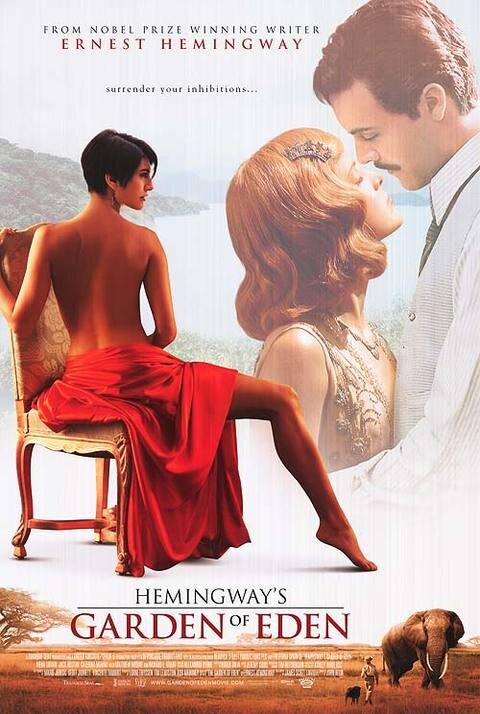Poster for the 2008 film adaptation of Ernest Hemingway’s The Garden of Eden
Teaching The Garden of Eden 2008 Film Adaptation. Teaching Hemingway and Film. Eds. Cam Cobb and Marc K. Dudley. Kent State UP. 2024.
This essay examines approaches to teaching the 2008 film adaptation of The Garden of Eden. The film, which was poorly reviewed is considered an example of Hemingway’s novels are unfilmable.
Annotation of Ernest Hemingway’s “God Rest You Merry, Gentlemen.” Reading Men Without Women. Eds. Mark Cirino and Susan Vandagriff. Kent State UP, 2022.
This essay/annotation provides historical, social, and cultural contexts for one of Hemingway’s most bizarre and troubling short stories. The narrative introduction is followed by an extensive line-by-line explanation of some of the more arcane or significant passages in the story. Listen to my One True Podcast Interview about this essay.
Blog post. ”Diving into the next Wave of Hemingway Studies" with Kirk Curnutt. FifteenEightyFour. Cambridge UP, 2020.
Kirk and I preview our edited volume, The New Hemingway Studies (Cambridge UP, 2020).
Ernest Hemingway and Anotonio Ordóñez during the dangerous summer of 1959
“F. Scott Fitzgerald and Ethnographic Stereotyping.” F. Scott Fitzgerald in Context. Ed. Bryant Mangum. New York: Cambridge UP, 2013.
This essay situates Fitzgerald’s use of racial and ethnic stereotypes in his writing within the cultural perceptions of and attitudes toward race and ethnicity in the first half of the twentieth century.
“The Cult and Afterlife of Ernest Hemingway.” Ernest Hemingway in Context. Eds. Debra A. Moddelmog and Suzanne del Gizzo. New York: Cambridge UP, 2013.
This essay explores the perception and use of the iconic author in popular culture since his death in 1961 in order to consider Hemingway’s lasting impact in our popular consciousness.
“Tracking the Elephant: David’s African Childhood in The Garden of Eden.” Hemingway and Africa. Ed. Miriam Mandel. New Jersey: Camden House, 2011.
This essay, based on a presentation given at the 2008 Hemingway Society conference in Kansas City, explores the significance of David Bourne’s childhood in Africa, particularly his experience of a brutal elephant hunt, for his development as a compassionate writer in The Garden of Eden.
“Glow-in-the-Dark Authors: Hemingway’s Critique of Literary Celebrity in Under Kilimanjaro.” The Hemingway Review. 29.2 (Spring 2010): 7-27.
This article explores Hemingway’s use of Africa as a recuperative and (re)creational space that is integrally linked to his struggle with literary celebrity.
"‘Can't Repeat the Past?’ Of course You Can't and Shouldn't: Filming The Great Gatsby for the 21st Century." Bright Lights Film Journal. 66 (Fall 2009): http://www.brightlightsfilm.com/66/66gatsby.html.
This essay examines the difficulty of adapting Fitzgerald’s The Great Gatsby for the screen and suggests the time is right to try again.
"Redefining Remate: Hemingway's Approach to Writing in A Moveable Feast." The Hemingway Review. 28.2 (Spring 2009): 121-26.
This brief article tracks the mistranslation and subsequent misuse of the Spanish term remate in Hemingway scholarship.
“The American Dream Unhinged: Romance and Reality in The Great Gatsby and Fight Club.” The Fitzgerald Review. 6 (2008): 69-94.
This article examines Chuck Palahniuk’s claim that Fight Club is a re-writing of The Great Gatsby by examining textual similarities and the novels’ critique of American consumer culture.
“Going Home: Hemingway, Primitivism, and Identity.” Modern Fiction Studies. 49 (Fall 2003): 496-523.
This essay explores Hemingway’s relationship to primitivism, particularly his use of Africa and racial and ethnic others, to distance himself from and ultimately critique his mainstream public persona.


